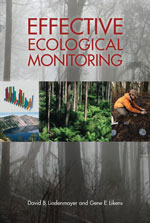 |
Effective ecological monitoringby David B Lindenmayer and Gene E Likens
Published in 2010 by CSIRO Publishing, illustrated, softback, 184 pages
Price $A49.95 plus $A13.50 postage within Australia [up to 3 kg], overseas postage please request a quote
ISBN 9780643096837 |
- About the book
- About the authors
About the book
Long-term monitoring programs are fundamental to understanding the natural environment and effectively tackling major environmental problems. Yet they are often done very poorly and ineffectively. Effective Ecological Monitoring describes what makes successful and unsuccessful long-term monitoring programs.
Short and to the point, it illustrates key aspects with case studies and examples. It is based on the collective experience of running long-term research and monitoring programs of the two authors – experience which spans more than 70 years.
The book first outlines why long-term monitoring is important, then discusses why long-term monitoring programs often fail. The authors then highlight what makes good and effective monitoring. These good and bad aspects of long-term monitoring programs are further illustrated in the fourth chapter of the book. The final chapter sums up the future of long-term monitoring programs and how to make them better, more effective and better targeted.
About the authors
David B Lindenmayer is a Research Professor at The Australian National University. He has worked on biodiversity conservation issues for over 25 years and maintains large-scale, long-term projects throughout south-eastern Australia. He is a member of the Australian Academy of Science and has won numerous awards for his work, including the Eureka Prize for Environmental Research, the Whitley Award (three times), the Ecological Society Research Award, the DaimlerChrysler Award and the Australian Natural History Medal. He has published 25 books and over 550 scientific articles as part of his long-term research.
Gene E Likens is Founding Director and President Emeritus of the Institute of Ecosystem Studies in Millbrook, New York, and now Distinguished Senior Scientist at the Cary Institute of Ecosystem Studies. His research focuses on the ecology and biogeochemistry of forest and aquatic ecosystems, primarily through long-term studies at the Hubbard Brook Experimental Forest. He is a member of the U.S. National Academy of Sciences, the American Philosophical Society, and is recipient of numerous awards, including the National Medal of Science, America’s highest science honour. He has published 19 books and more than 500 scientific articles.